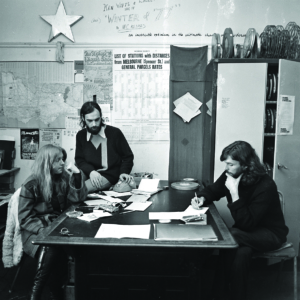We’ve all heard that junk food, particularly fat and sugar, is bad for our health. What we may not know is that sugar is devious – it goes by many names and hides in unlikely places. Damon Gameau’s That Sugar Film (2014) aims to expose the true nature of this delicious, dangerous substance – and its message is pretty convincing.
My family’s love of sweets runs through our veins like children jacked up on red cordial. Growing up, we’d always have a sugary dessert after dinner – self-saucing pudding, canned fruit, or pikelets with maple syrup and ice-cream. Dessert was a staple, the way veggies were included in every main meal. I also grew up in the 1990s, in a world of Push Pops, Fads and Fruit Roll-Ups – all of them as unashamedly bright in colour as my elastic spring shoelaces.
These days, my snacks may be less fluoro and may feature more pictures of real fruit on the packaging, but there’s still an exorbitant amount of added sugar in them, even if they are advertised as ‘healthy’. Gameau’s film aims to demonstrate just how bad for our health high-sugar foods are, and reveals – in a highly accessible way – how even food that is supposedly healthy is full of sugar.
That Sugar Film rides on the back of the booming health industry; it seems we’ve always loved to cut things out. There was the low-carb Atkins diet, popular at the start of the 2000s, which was a step up from the no-fat diet of the 1990s. Now we have the Paleo diet, which encourages us to eat what our ancestors did, minus the scavenged decomposing meat and cyanide-laced wild almonds. Most recently, we’ve also become obsessed with ridding ourselves of sugar: the books Sweet Poison by David Gillespie and I Quit Sugar by Sarah Wilson, for instance, advise us to do things like reduce or, at times, cease our consumption of fruit due to its fructose content.
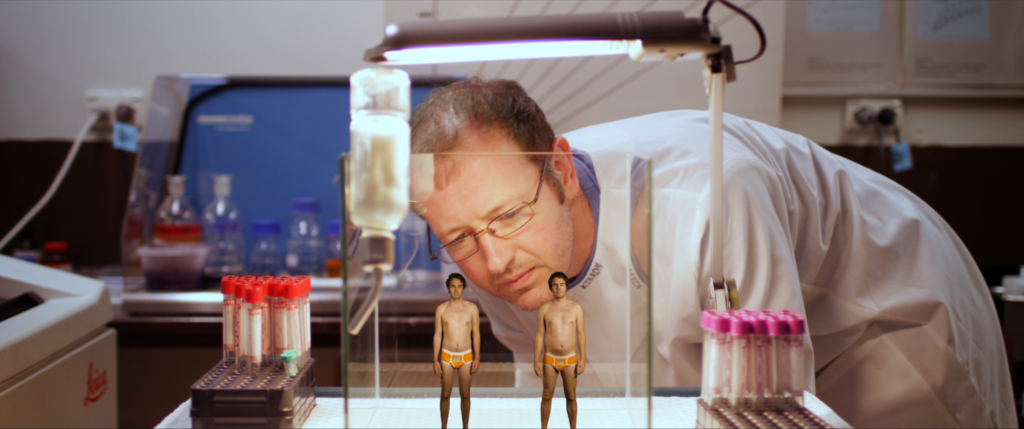
Sugar by any other name
It’s tempting to listen to advocates of sugar-free eating like Gillespie, Wilson and Gameau, even though they aren’t health professionals themselves, as their own lives provide evidence supporting their arguments. They are the guinea pigs of their own experiments – heroes of a quest they’ve set themselves.
And what a quest we watch in That Sugar Film. Going against everything you ever thought was good and right about food, Gameau’s regular diet consists of 50 per cent fats (from ‘healthy’ sources such as avocado and nuts), 26 per cent protein (from eggs, meat and fish) and 24 per cent carbohydrates (from ‘fresh vegetables’).[1]Damon Gameau, That Sugar Book, Pan Macmillan, Sydney, 2015, p. 24. ‘But fat is bad!’ I hear you cry. Not as bad as sugar, apparently. After following a diet containing little to no sugar for three years, Gameau turns his eating habits upside-down. He starts consuming 40 teaspoons of sugar a day for sixty days, which allegedly matches the national average. The recommended daily intake, however, is 6–9 teaspoons a day. The kicker is that he doesn’t consume junk food or fast food, but rather foods that we perceive to be ‘healthy’, such as yoghurt, muesli bars and fruit juice. Disturbingly, he is easily able to eat 40 teaspoons of sugar a day. This is in part due to the fact that added sugar hides behind nearly sixty names, including cane juice, blackstrap molasses and fruit juice concentrate.[2]ibid., p. 138.
I’ve been on many diets over the last fifteen years … But the diet Gameau proposes would prove to be the hardest for me to try because sugar is in everything – and I’m addicted.
This film is likely to be even more impactful than the Academy Award–nominated Super Size Me (Morgan Spurlock, 2004), as it looks at ‘healthy’ foods marketed using language like ‘99% fat free’, ‘high in calcium’ and ‘with ten essential vitamins and minerals’, but can contain over 4 teaspoons of added sugar per serve. Super Size Me likely didn’t affect the habits of people who were health-conscious to begin with, because it was addressing the food we already knew was unhealthy. That Sugar Film, however, highlights how eating ‘healthy’ foods could actually be harming us.
On the first morning of his experiment, Gameau consumes 22 teaspoons of added sugar for breakfast, contained in low-fat yoghurt, apple juice and what’s marketed as ‘healthy’ cereal. As the documentary unfolds – and as Gameau descends into a nightmarish sugar-addicted state – his argument becomes more compelling. He’s the archetypal suffering hero: a not-unattractive bloke living in a weatherboard house with his girlfriend, Zoe Tuckwell-Smith, who is soon to give birth. She and their unborn child provide the impetus for Gameau’s hero’s journey.
Predictably, Gameau’s health is adversely affected – weight gain, detrimental effects on cholesterol levels and liver function, and dips in mood. All while consuming the same amount of calories as he did on his regular high-fat, no-sugar diet.
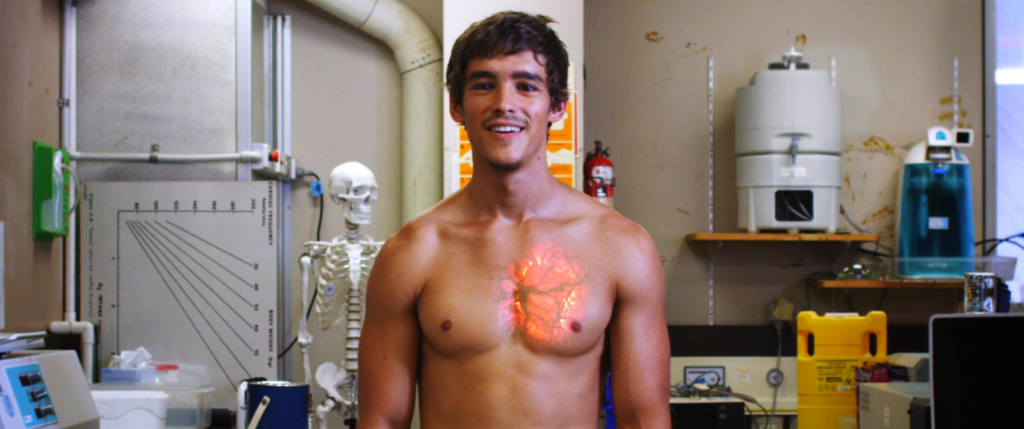
Bitter truths
The gonzo approach that Gameau employs in That Sugar Film is a tried-and-true documentary filmmaking technique, aiming for the greatest impact. In fact, Gameau has many predecessors. There’s Michael Moore, who campaigns alongside his subjects for social justice. There’s Louis Theroux, who joins his subjects in their natural habitat and often participates in their hobbies, such as game hunting and even liposuction. And there’s Spurlock himself, who consumed only McDonald’s food for thirty days. A similar attempt at tackling fast food can be seen in King Corn (Aaron Woolf, 2007), in which two friends discover that North American farmers are encouraged to grow corn over other crops, which is then turned into high-fructose corn syrup, an ingredient used by the fast-food industry. In Gameau’s case, he isn’t suggesting that we exclude certain foods the way some extreme diets advocate. Though it’s that same old ‘just eat healthy’ argument that we’re constantly hearing, That Sugar Film reminds us that it might not be so simple. That marketing may trump health when it comes to manufactured food. That the manufacturers of these foods may not even know the health effects of their sugary products because fat was always seen as the enemy.
Gameau is supported by a group of professionals throughout his experiment, including general practitioner Debbie Herbst, pathologist Ken Sikaris and nutritionist Sharon Johnston. Every now and then, we get informative vox pops from various academics and authors, including Gillespie himself. In one segment, we are informed that sugar may actually be worse for us than fat. The film briefly explores the sugar conspiracy of the 1950s, illuminating how there were two camps – scientists who believed excess fat consumption is bad for health, and those who thought the same about sugar. As our recent history shows, the fat-opposers won.
That Sugar Film also includes a moving appeal to improve the lives of those in remote Indigenous communities such as Amata in South Australia by providing healthier options in grocery stores instead of soft drinks. Gameau goes on a similar quest to discover how the fast-food industry has adversely affected the health of people in the US. That Sugar Film reveals how important sugar has been for the food industry, not only as a preservative, but also as a way to make products more appealing. Ultimately, the film suggests that sugar’s addictive quality has us in its grip.
These intimidating facts are interspersed with moments of humour. There’s the obligatory subject-in-their-underwear shot, with the tongue-in-cheek phrase ‘sweet spot’ written on the front. There are some quaint cameos by Stephen Fry, Brenton Thwaites, Isabel Lucas, Jessica Marais and Hugh Jackman. There’s even a song about ‘Mr Sugar’, the personification of the substance, sung by Gameau and accompanied by a troupe of children. The animation is bright and colourful – verging on saccharine (heh) – though I must admit that it was a little distracting. Then again, parts of the film did need to be as lighthearted as this to counterbalance the grim evidence for the argument against added sugar.
After the screening, I walked out of the cinema, went straight to the supermarket, and bought a salad, strawberries, grapes and coconut oil, even though I’d previously scoffed at the coconut oil obsession we seem to be having of late.
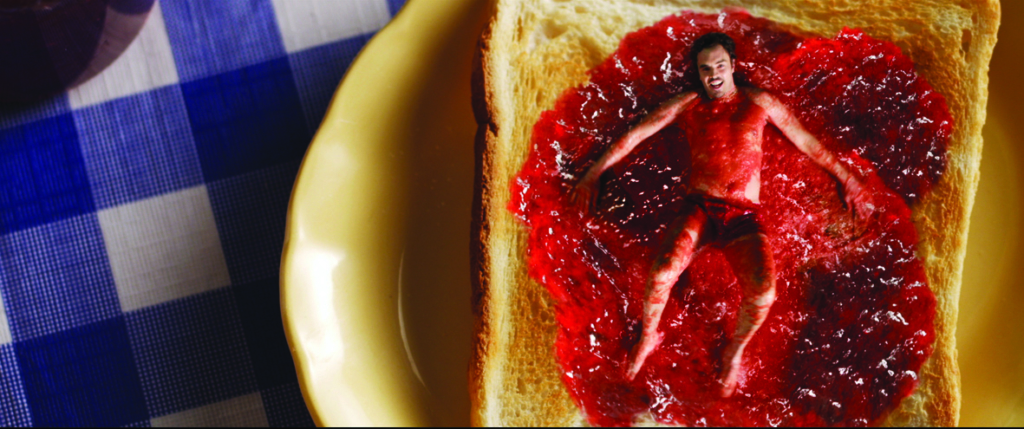
Not a piece of cake
It’s hard for someone impressionable like myself to watch this film and not be affected. So I tried to cut out sugar. My usual diet doesn’t include a lot of processed foods to begin with – I have a fructose and sorbitol intolerance, so I can’t have many sauces, fruity yoghurt, muesli bars or diet foods. But I do love sugary cereal and adding maple syrup to things, and often eat half a block of chocolate in one sitting. Sometimes I do this a few times a week, sometimes every day. I love the rush it gives me, and it noticeably improves my mood. The drawback is that after the spike comes the crash, the grogginess, the feeling that I’ve done some damage.
I grew up thinking that any kind of fat – whether it be dairy, eggs or oil – is bad, so you should only ever eat small amounts. I’d choose lolly snakes over chocolate because of the latter’s fat content, thinking that sugar was less bad because it didn’t have the sticking power that fat and cholesterol have. Eating so much fat and no sugar went against all my instincts.
I’ve been on many diets over the last fifteen years. I’ve tried cutting out dairy to improve my acne, been on a vegetarian diet for environmental and ethical reasons, then an elimination diet to find out what was wrong with my digestive system, and finally a fructose-and-sorbitol-free diet because it turned out those sugars were making me ill. But the diet Gameau proposes would prove to be the hardest for me to try because sugar is in everything – and I’m addicted. The low-sugar diet took a while to get into. I continued to eat the fruits that I’m able to digest, but stopped eating chocolate, ice-cream and cereal. After about a week, I got my sugar intake down to around 1–2 teaspoons a day, added to tea or oats. It was like an out-of-body experience – I didn’t feel at all like my usual energetic self – though maybe my brain was just trying to leech any sweetness from my now pure, sugar-free blood.
Then all semblance of my personality dissipated. Then the headaches started (though this may have been due to coffee). I felt cranky for a few days. Sure, when I looked in the mirror, my skin appeared to be glowing – but that may have just been the halo effect my fatigue was having on my vision. That said, I was also more sated. I was snacking less, and fruit became more desirable the less sugar I ate. I even felt like I was less jiggly – all without any changes to my exercise regime.
After a few weeks of eating this high-protein and -fat diet, the jiggle came back. The jiggle always comes back because, like addicts, we must find another thing to fill the gap, and I had found animal fat. The problem was that I couldn’t eat Gameau’s recommended amount of avocado – a source of ‘good’ fat – to fill that gap, as it contains sorbitol. Once again, I felt like I was doing damage; as an article in The Guardian reports, a recent study has suggested that animal protein can actually be detrimental for our health.[3]Ian Sample, ‘Diets High in Meat, Eggs and Dairy Could Be as Harmful to Health as Smoking’, The Guardian, 6 March 2014, <http://www.theguardian.com/science/2014/mar/04/animal-protein-diets-smoking-meat-eggs-dairy>, accessed 26 May 2015.
Eventually, I went back to eating sugar because I don’t live in a vacuum in which I have the time or inclination to control everything I eat. I like to dine out with friends and indulge in celebratory cake-eating. For now, I’ll just try to cut down on the sweets; maybe eventually I’ll get there.
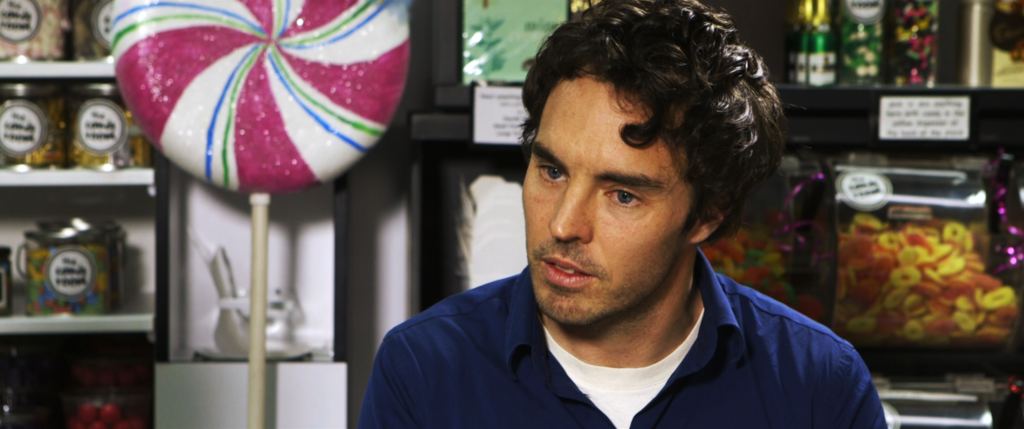
Sweetening the deal
Despite the film’s effective mixture of scientific fact, scintillating humour and self-experimentation, there were some things I was sceptical about. Gameau’s experiment involved such a small sample size, as my own experiment had. Can we really trust the evidence from a restricted group of individuals? Likewise, his test results showed that things in his body had changed, but those could have been from the stresses of travelling, filming a movie and/or his wife’s pregnancy. In my case, maybe I became slimmer because it was a month in which I was working less and therefore spending less time sitting at a desk. Another thing I have trouble with is some of the language used, not just in the documentary, but also in its accompanying tome, That Sugar Book. I have a knee-jerk reaction – as I’m sure many do – when someone ostensibly basing their argument on science says something like ‘your body is releasing all the toxins’ when you stop eating sugar.[4]Gameau, op. cit., p. 153.
The film’s Facebook page does accommodate open dialogue between sceptics and believers, showing that not everyone is convinced by Gameau’s findings. While there are those who have posted about losing 6 kilograms in three weeks after having cut sugar from their diet, others are asking for sugar to not be demonised in a manner comparable to illegal substances. The discussion continues beyond the documentary’s online spaces, too. The Dietitians Association of Australia, for example, commends the documentary for ‘get[ting] Australians to think more about how they fuel their body’, but also asserts that
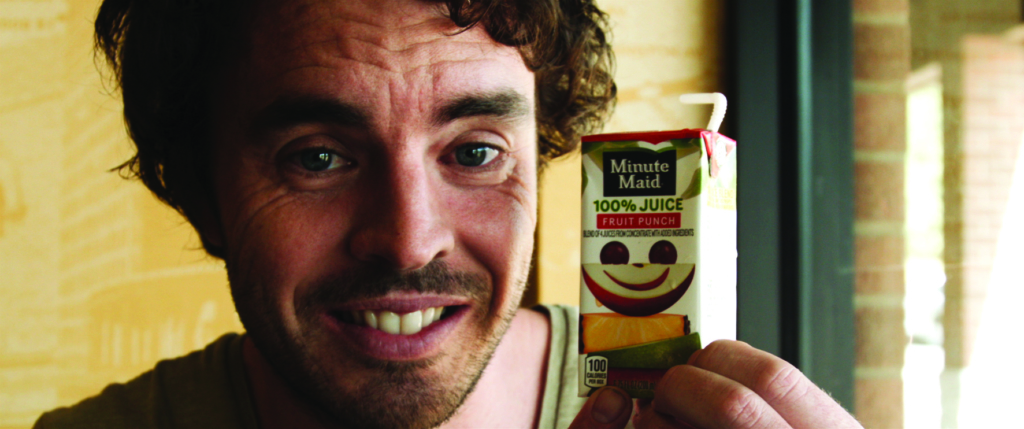
it is simplistic and unhelpful to blame sugar alone for rising rates of overweight and obesity […] tackling [these issues] requires a comprehensive, coordinated and evidence-based approach, taking into account dietary and lifestyle factors as a whole.[5]Dietitians Association of Australia, ‘That Sugar Film’, <http://daa.asn.au/that-sugar-film/>, accessed 26 May 2015.
Ultimately, we must remember that That Sugar Film is but one voice in a huge and complex debate, up against popular opinion, scientific rigour and the clever marketing of the food industry. It’s worth celebrating that someone is advocating for ‘healthy eating’, especially in such an entertaining and accessible way, and perhaps this film can provide a starting point for further long-term research. And if – unlike my own experience – children can be inspired to eat unprocessed foods, to not be afraid of fruit and vegetables, and to avoid a seeming dependence on sugary treats, then maybe Gameau is onto a good thing.
Endnotes
| 1 | Damon Gameau, That Sugar Book, Pan Macmillan, Sydney, 2015, p. 24. |
|---|---|
| 2 | ibid., p. 138. |
| 3 | Ian Sample, ‘Diets High in Meat, Eggs and Dairy Could Be as Harmful to Health as Smoking’, The Guardian, 6 March 2014, <http://www.theguardian.com/science/2014/mar/04/animal-protein-diets-smoking-meat-eggs-dairy>, accessed 26 May 2015. |
| 4 | Gameau, op. cit., p. 153. |
| 5 | Dietitians Association of Australia, ‘That Sugar Film’, <http://daa.asn.au/that-sugar-film/>, accessed 26 May 2015. |



